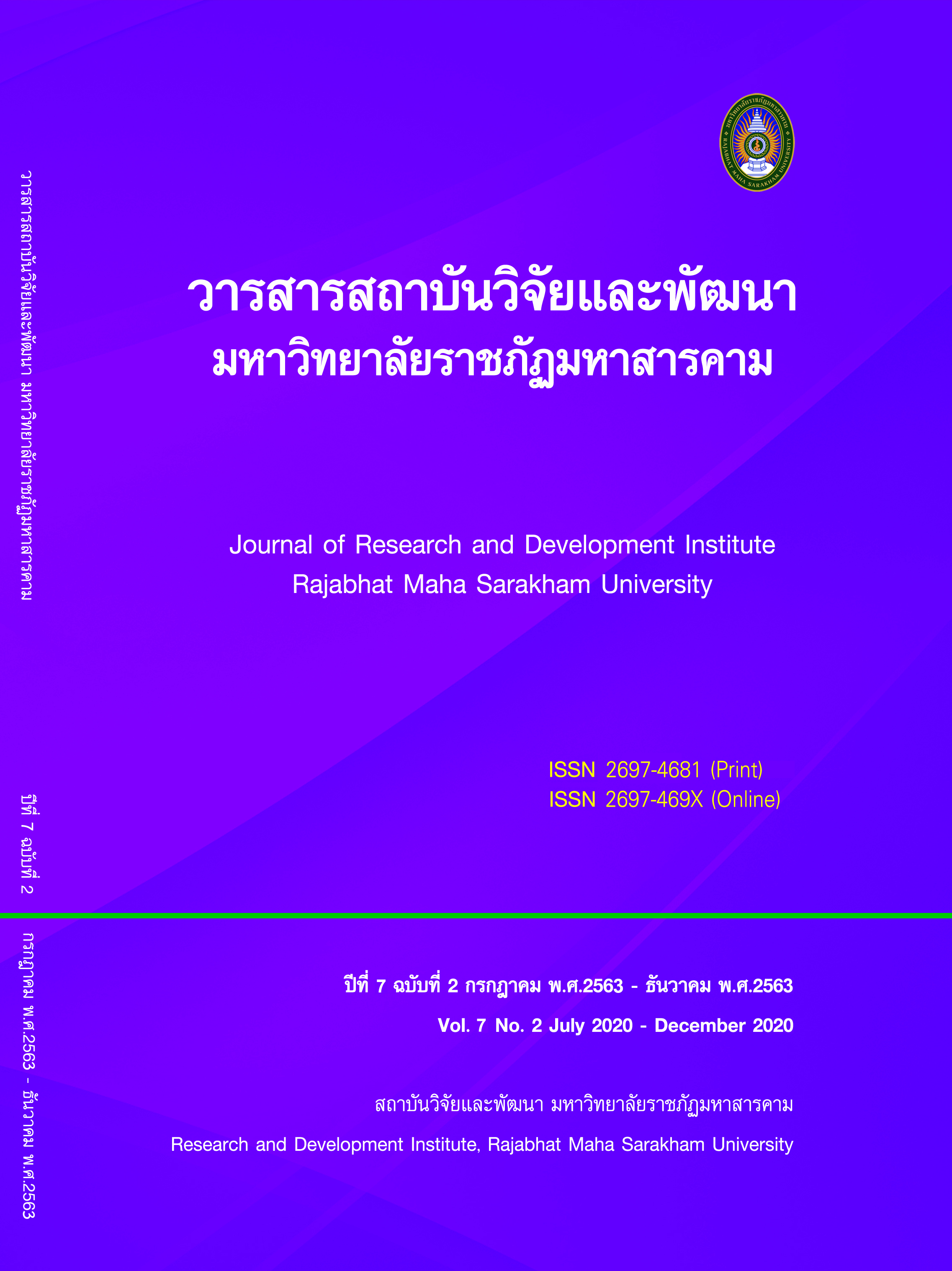Development on physical fitness of secondary education students (Grade 3) using CIPPA learning management Model
Keywords:
Physical fitness, CIIPA model learning management, Health promotion behaviorsAbstract
The purposes of this studying is in order to (1) develop the CIIPA model learning management of health and physical learning group for secondary education students in grade 3. (2) Study the physical fitness of students. (3) Study health promotion behaviors and physical fitness of students. (4) Compare the learning achievement before studying and after studying by CIPPA model learning management and (5) study the satisfactions of students to the learning by CIPPA model learning management. There are fifty students in this study group. They are secondary education students in grade 3/6. This research tools consist of (1) the lesson plans of the CIPPA model, (2) the physical fitness tests, (3) the health promotion behavioral and Physical fitness records, (4) the learning achievement tests and (5) the satisfaction questionnaire CIPPA model learning management. The analyze statistic data percentage ,average, standard deviation and t-test (Dependent sample).
The result of studying showed that (1) the lesson plans of the CIPPA model learning management are average at 4.53 in the highest level. (2) The physical fitness of the males and females students are moderate and low respectively. (3) The Health promotion behaviors and physical fitness is average at 4.11 in the high level. (4) The learning achievement of students learning by CIPPA model learning management after studying are higher than before studying in statistical significance at .05 and (5) the satisfactions of students with the CIPPA model learning management is average at 4.57 in the highest level.
References
References
Bulan Chidthaisong. (2014). Development of a learning kit on substance abuse, health education and physical education subject groups by zippa learning management for grade 1 students. Master of Education Thesis: Buriram Rajabhat University.
Health Education and Physical Education Learning Group, Phadungnaree School. (2018). A study of physical fitness of students in Mathayom 3, Academic Year 2018. Maha Sarakham : Phadungnaree School.
Kannikar Srisombat. (2015). Developing Students’ Learning Achievements and Science Process Skills for Primary Educational Students with the CIPPA Model and Accompany Graphics on the Content of Classification at the Fifth-Grade Level. Master of Education Thesis : Maha Sarakham Rajabhat University.
Kitti Paramatthaphon. (2019). Textbooks for health education, grade 3. Bangkok: Emphan Publishing Company Limited.
Kusumavadee Kamkliang. (2019). Textbooks for health education, grade 6. Bangkok: Aim Phan Publishing Company Limited.
Ministry of Education. (2008). Basic Education Core Curriculum 2008. Bangkok: Printing House, Agricultural Cooperative Association of Thailand Co., Ltd.
Narintorn Wongsisa. (2018). Development of a sex education training course using the CIPPA teaching model (CIPPA) for the third grade level. Master of Education Thesis: Maha Sarakham Rajabhat University.
Office for Accreditation and Quality Assessment. (2012). Executive Summary of External Quality Assessment of Educational Institutions Round 3. Bangkok : Office for Accreditation and Quality Assessment.
Passaraporn Manipuk. (2017). CIPPA Learning Management on the basic skills of volleyball of Grade 3 students. Master of Education Thesis: Maha Sarakham Rajabhat University.
Phichit Phutchan. (1990). Sports science. Bangkok: Saeng Silp Printing.
Pornsuk Hunnirun. (2016). Textbooks for health education, grade 3. 8th edition.Bangkok: Aksorn Charoenthat Co., Ltd.
Russarin Prangsuwan. (2016). The communication skills development Thai language learning subject group using the CIPPA Model Teaching Model (CIPPA Model), for students in grade 5. Master of Education Thesis: Buriram Rajabhat University.
Sawian Prawannatha. (2010). Development of learning activities through the process of searching for knowledge on plant life, Science Learning Group, Grade 4.. Master of Education Thesis (Curriculum and Instruction): Mahasarakham University.
Sumlee Duangbubpha. (2015). The Development of the Mathematical Skill Package n the Integral Number as Complement for Organizing the Learning Activities Based on CIPPA Model for Mattayomsuksa One Students. Journal of Industrial Technology Ubon Ratchathani Rajabhat University, 5 (1), 135-148.
Wimolrat Soonthornroj. (2009). Innovation in learning Thai language. Mahasarakham : Coordinate printing.
Downloads
Published
How to Cite
Issue
Section
License
Articles that are published are copyrighted by the authors of the articles







